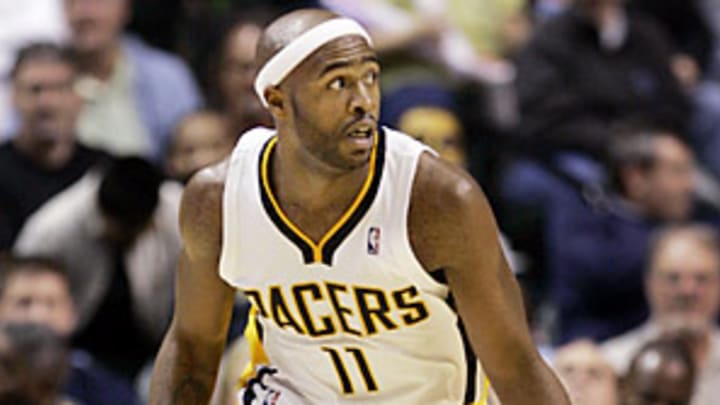Williams, Tinsley add intrigue to crop of free-agent point guards

Jason Williams and Jamaal Tinsley aren't good enough to create public clamor by becoming free agents. They were not able to in their finest moments, and this definitely is not that, so the fitting-in thing serves them much better anyway after previous brushes as a spectacle. A spotlight is the last thing they should want in their comeback summer.
But change the market did. Williams is a late-arriving unrestricted free agent at point guard, and Tinsley is a late-arriving unrestricted free agent at point guard, and, my, that does make things more interesting.
Neither is Ramon Sessions in standing or projected long-term payoff among available ball handlers. But Sessions is a restricted free agent, and the Bucks will match any reasonable offer sheet, and every opponent knows it and probably won't go through the trouble of a contract that will turn out to be nothing more than doing Milwaukee's legwork.
Neither is Allen Iverson in marketing splash, and generating ticket sales is a bigger deal in this economy than ever. But Iverson has a bad image, maybe even worse than Tinsley if that's possible, will almost certainly cost more than Tinsley or Williams, and will be much more particular about picking a spot with a clear path to a starting job.
Neither is Raymond Felton, a starting point guard last season (in Charlotte), a 25 year old with the promise of a long career, though also restricted.
Williams and Tinsley just need to get back in. Minimum contracts, come off the bench. Whatever. Unique players with unique situations and awkward paths to free agency.
Williams signed a one-year deal with the Clippers last August, which prompted L.A. to stop pursuing a backup for Baron Davis, an important job as the Clips envisioned a playoff push, only to have J-Will claim retirement just before camp opened. Later in the season, he decided he wanted to play again.
Nice try, Favre.
The NBA rightfully blocked the move, saying it would take a unanimous vote of the Board of Governors to be re-instated during the season, lest anyone else get the idea to (cough, cough) retire to jump a commitment, and added that the Clippers would have the first chance to sign Williams if he wanted to play again. So many restrictions were put in place that teams could be charged with tampering just for calling his agent, Dan Tobin.
Last Friday, the Clippers waived their negotiating rights. Williams will become a free agent this Friday, assuming he clears waivers, and joins the free-agent market about a month behind everyone else.
Or most everyone else.
While Williams' availability at some stage was expected, Tinsley as a free agent is one of the offseason surprises. He had two years left on his Pacers contract, was banned from any involvement with the team or use of the facilities by an Indy management tired of off-court turmoil, was left out of the media guide despite being on the roster ... but the front office said there would be no buyout to end the relationship and save money in the process. Team policy. The Pacers would trade him if they could, but would not pay him to go away.
That changed as the arbitration hearing drew closer and the issue was about to return to the front pages, with Tinsley expected to argue it would be unfair to keep him in an indefinite timeout. Maybe a Pacers lawyer or one from the league office let ownership or president Larry Bird know the team could lose and be forced to put Tinsley on the active roster or waive him at full price. Wanting to be done with the mess once and for all, they did the buyout July 22, reported by the Indianapolis Star to be $10.7 million of the $14.7 million Tinsley had coming.
That makes two very interesting cases that, in the development that matter to personnel departments, are both easier gets than Sessions or Iverson, the biggest names remaining among point guards. Williams started at the point for a championship team, the 2006 Heat, and Tinsley has extensive playoff experience. Tinsley, in particular, should be especially open to listening to all opportunities. He spent an entire season exiled and needs a chance, any chance. By contrast, Williams' absence was his own decision and league officials merely helped him keep it, but he may be choosy enough to say, as was the case in '08-09, that a return would come with a team in the south or east to be close to his Florida home base.
Said the general manager of a team not shopping for a point guard, defining the challenge for Tinsley in free agency: "I love his game. But I don't know who can afford to take a guy like that."
Afford having nothing to do with money.
"The personality thing," the GM clarified.
Williams and Tinsley go into the bin of veteran point guards on the market that also includes Stephon Marbury, Anthony Carter, Jason Hart, Kevin Ollie, Tyronn Lue, Bobby Jackson, Jacque Vaughn, Brevin Knight. Teams have options for experience.
The case studies come as the latest installment of what has been a cycle dominated by the position: Derrick Rose won Rookie of the Year, the acquisition of Chauncey Billups pushed the Nuggets to unexpected heights, point guards dotted the lottery, Aaron Brooks nearly ended the Lakers' parade before it started, point guards were four of the top nine vote getters in All-Rookie balloting, and now the strange twist of late comers to free agency. The landscape changes again.
